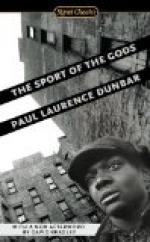When Joe was taken, there was no spirit or feeling left in him. He moved mechanically, as if without sense or volition. The first impression he gave was that of a man over-acting insanity. But this was soon removed by the very indifference with which he met everything concerned with his crime. From the very first he made no effort to exonerate or to vindicate himself. He talked little and only in a dry, stupefied way. He was as one whose soul is dead, and perhaps it was; for all the little soul of him had been wrapped up in the body of this one woman, and the stroke that took her life had killed him too.
The men who examined him were irritated beyond measure. There was nothing for them to exercise their ingenuity upon. He left them nothing to search for. Their most damning question he answered with an apathy that showed absolutely no interest in the matter. It was as if some one whom he did not care about had committed a crime and he had been called to testify. The only thing which he noticed or seemed to have any affection for was a little pet dog which had been hers and which they sometimes allowed to be with him after the life sentence had been passed upon him and when he was awaiting removal. He would sit for hours with the little animal in his lap, caressing it dumbly. There was a mute sorrow in the eyes of both man and dog, and they seemed to take comfort in each other’s presence. There was no need of any sign between them. They had both loved her, had they not? So they understood.
Sadness saw him and came back to the Banner, torn and unnerved by the sight. “I saw him,” he said with a shudder, “and it ’ll take more whiskey than Jack can give me in a year to wash the memory of him out of me. Why, man, it shocked me all through. It ’s a pity they did n’t send him to the chair. It could n’t have done him much harm and would have been a real mercy.”
And so Sadness and all the club, with a muttered “Poor devil!” dismissed him. He was gone. Why should they worry? Only one more who had got into the whirlpool, enjoyed the sensation for a moment, and then swept dizzily down. There were, indeed, some who for an earnest hour sermonised about it and said, “Here is another example of the pernicious influence of the city on untrained negroes. Oh, is there no way to keep these people from rushing away from the small villages and country districts of the South up to the cities, where they cannot battle with the terrible force of a strange and unusual environment? Is there no way to prove to them that woollen-shirted, brown-jeaned simplicity is infinitely better than broad-clothed degradation?” They wanted to preach to these people that good agriculture is better than bad art,—that it was better and nobler for them to sing to God across the Southern fields than to dance for rowdies in the Northern halls. They wanted to dare to say that the South has its faults—no one condones them—and its disadvantages, but that even what they suffered from these was better than what awaited them in the great alleys of New York. Down there, the bodies were restrained, and they chafed; but here the soul would fester, and they would be content.




